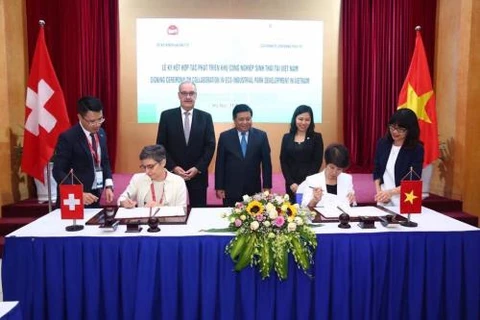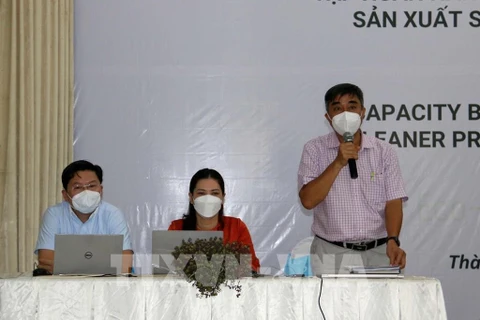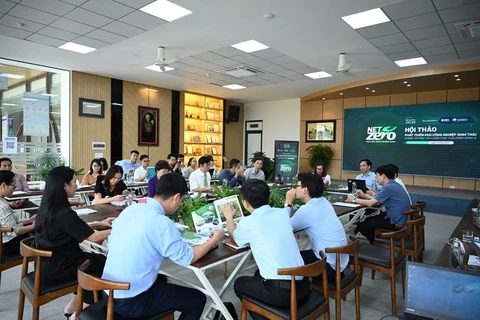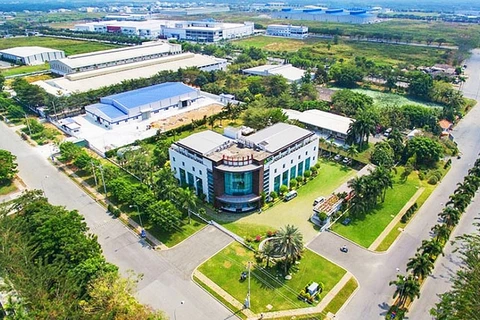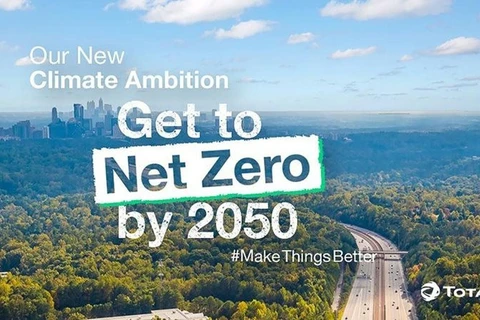 Eco-industrial parks become a selection criterion for foreign direct investors with the goal of sustainable development (Photo: VietnamPlus)
Eco-industrial parks become a selection criterion for foreign direct investors with the goal of sustainable development (Photo: VietnamPlus) Hanoi (VNA) - Eco-industrial parks are important to counter climate change, developing the green industry, ensuring energy security, and demonstrating the Government's political determination to sustainable development, said insiders.
After more than 30 years of establishment and development, economic zones (EZs) and industrial parks (IPs) have become important factors in attracting investment, and promoting economic growth of the country, increasing export turnover, and expanding international markets. They have contributed significantly to increasing State budget revenue and creating jobs for workers.
Environmental protection in EZs and IPs is considered an important goal to achieve sustainable development, promoting and ensuring people's right to live in a clean environment.
According to statistics reported by the Ministry of Planning and Investment (MPI), by the end of 2022, Vietnam had 407 IPs, 18 coastal EZs, and 26 border gate EZs in provinces and cities nationwide, attracting over 21,000 domestic and foreign projects with total capital of about 340 billion USD. Contribution of these accounts for nearly 12% of the total State budget revenue.
However, the Government's Environmental Protection Report pointed out that there remain projects operating in EZs and IPs in the industries at risk of environmental pollution. These include metallurgy, mining, ship demolition, pulp and paper, textile dyeing, leather tanning, petroleum refining, thermal power, steel, chemicals, and chemical fertilisers, accounting for a large proportion of wastewater and hazardous waste discharge.
The number of IPs that do not have a centralised wastewater treatment system, and those that have not yet been inspected and confirmed the completion of environmental protection work accounts for 10% and 20%, respectively.
In particular, the number of IPs that do not have facilities to prevent and respond to environmental incidents in accordance with regulations makes up 75%.
The quality of water resources in river basins that receive wastewater in general and industrial wastewater from IPs and EZs in particular shows signs of pollution with many parameters exceeding standards.
To increase the sustainability of industrial production, reduce environmental pollution, and ensure economic and social benefits of IPs, the Ethereum Improvement Proposals (EIP) model was initiated. This is a prerequisite for building models of eco-industrial parks.
Eco-industrial park – model for a greener future
The eco-industrial park model has been clearly stated by the Government in Decree No. 35/2022/ND-CP May 28, 2022 regulating the management of IPs and EZs, and regulations related to the circular economy.
According to Le Thanh Quan, Director of the Department of Economic Zones Management under the MPI, developing the eco parks is an optimal solution to develop a circular economy to replace the traditional linear economy.
Eco-industrial parks have become a selection criterion for foreign investors with the goal of sustainable development, creating economic benefits, and implementing responsibility to the community and society, he said.
Eco-industrial parks will contribute significantly to efforts to respond to climate change, mobilise resources from the private sector for green industrial solutions, ensure energy security, and demonstrate the political determination of the Government in implementing sustainable development commitments, Quan went on.
 Photo: Forms of industrial symbiosis are based on market principles. The form helps reduce transportation costs due to the advantage of geographical distance. (Photo: Vietnamplus)
Photo: Forms of industrial symbiosis are based on market principles. The form helps reduce transportation costs due to the advantage of geographical distance. (Photo: Vietnamplus) Quan said the MPI coordinated with the United Nations Industrial Development Organisation (UNIDO) to pilot eco-industrial park models in the northern province of Ninh Binh, the central city of Da Nang, and the Mekong Delta city of Can Tho during 2015 - 2019.
As a result, over 72 businesses implemented more than 900 resource efficient and cleaner production (RECP) solutions. The moves saved 76 billion VND (over 3.1 million USD) per year and mobilised about 207 billion VND from the private sector. The results were a cut of 32 kilo tons of CO2 per year, bringing economic, social and environmental benefits.
In 2020 – 2023, three IPs in HCM City, the northern city of Hai Phong and the southern province of Dong Nai have been converted to the eco-industrial park model in accordance with the international framework. This is the premise for replicating this model across the country, Quan noted./.

